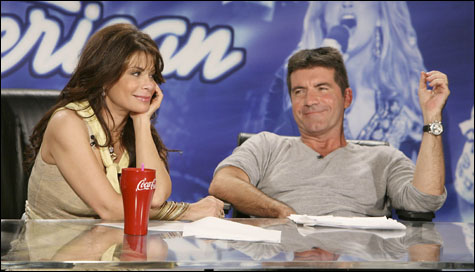
IDOLATRY: Being “rubbished” by Cowell is the whole point of American Idol. |
“But as you pin me down, my arms down on the ground/And your spit drips into my face/Deep in the back of your mind remember at some point you’ll have to fall asleep . . . ” With these lilting, weirdly gladiatorial words from Heywood Banks’s “Revenge Song,” words addressed to the judges by a pale young man got up in a style he described as “urban Amish” (broad-brimmed hat, free-growing beard), the sixth season of American Idol was inaugurated (Fox, Tuesdays at 8 pm and Wednesdays at 9 pm). Violence was in the air, and the promise of simmering humiliations. The judges looked sour: Day One of the auditions, in Minneapolis, and already they seemed staled by the process. “I don’t know what I’m doing on this show anymore,” complained legendary meanie Simon Cowell. “The fact that we’re taking this seriously . . . It’s not normal. You’re dressed as a boxer, singing opera,” he said to a man who was dressed as a boxer, singing opera.
Six seasons is a long time in reality TV. Idol’s three judges have hardened (or, in the case of Paula Abdul, disintegrated) irretrievably into their various personae, catch phrases, and favorite sweaters and all. Randy Jackson sits dense and immovable beneath his armature of good fellowship, heavy forearms on the desk, saying “What’s up, dawg?” and leaking that fatal bass chuckle when he smells someone’s doom. Cowell leans back and sucks his pen, or swivels waspishly on his chair. And Paula is multi-hued, volatile, in a permanent dither of helpless generosity. Silently she implores each contestant to be wonderful. “I think you’re very special,” she manages, eyes brimming, at the end of every performance. When Cowell goes over the line, she erupts in fragrant protest: “You’re such an asshole!”, paddling at him with dazed little hands. Her style shifts: one day she is an exotic flutter of colored silks, like a miniature heathen army, with Gypsy hoops clanking at her ears; the next it’s a coppery metallic top, nude lipstick, and gleaming pats of bronzer on her cheeks. But her love is constant; her love is sustenance and succor. At the New York auditions she went briefly AWOL, and the contestants were horrified: how to survive in there without the heat of Paula’s love?

Cowell, of course, is what they’re most afraid of, him and his cold-voiced English pejoratives. “Pointless,” “hideous,” “dreadful,” “appalling,” “ghastly,” and — the very icicle point of offensiveness — “rubbish.” To the feistier auditionees it is as if he had invented the word “rubbish,” as if it came out of some private jabberwocky of insult. “Aw, ruckush! Muffish!” retorted an angry woman in New York. High-camp avenger Ian Benardo heard it halfway through his drawled rendition of “Gloria” and threw a fit: “That’s British for garbage? Like what is that? Like rubbish? Who says that word even?” His chinchilla wrap twitched in fury. “You’re not even American and you’re in MY country and you’re going to tell ME what an American Idol is?!”
But being rubbished by Cowell is the whole point of American Idol, and the reason the show has been the biggest thing on TV for the past five years. Each successive season seems to tap into a vaster ferment of delusion, a wilder and more desperate underworld of gibbering no-talents, and it has fallen to Cowell alone to sort them out. Randy is too impermeably jovial, Paula too scattered and all-mothering; only nasty Simon can deal the death blow. “Your future involves not singing,” he promised one teenager, a spotty boy who had augmented his vocal performance by dismally hopping about with some feathered juggling sticks. The boy came roaring out of the audition room with tears and curses — “Fuck him! [bleeped, of course, by Fox] He said that I sum up Minneapolis! That it’s my fault Minneapolis has no talent!” — but even here (poor kid!) one could see the justice of it: Cowell had stung him into life, out of the drabness of his dreaming and into full-color reality.
Cowell is no respecter of the vulnerable, and as well as inducing paroxysms of piety in his show-biz peers (“The whole thing, it’s terribly sad to me,” lamented Rosie O’Donnell recently), his cruelty has spawned a secondary industry of victimhood. Special Olympian Jonathan Jayne and his equally special friend Kenneth Briggs — described by Cowell as looking “like one of those creatures that live in the jungle with those massive eyes” — got booted off Idol straight onto the couches of The View, where their hurt feelings were massaged by the ladies. Then Jimmy Kimmel sent them to the Super Bowl. The aforementioned Ian Benardo was interviewed by Larry King, as was Chris Henry, whose pure castrato voice had moved Cowell to suggest that he should be singing “in a dress and stilettos.” (Growled Larry: “Was that rude, Chris?”) Cowell is also reliably lecherous. When a shapely contestant leaves the audition room, his eyes make a quick dip asswards — the camera never fails to catch it.